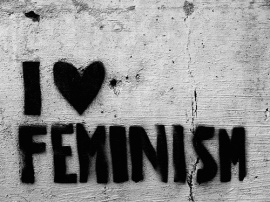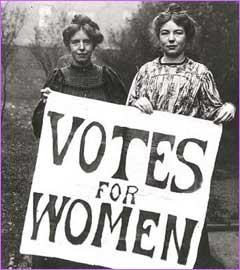The woman who follows the crowd will usually go no further than the crowd.
The woman who walks alone is likely to find herself in places no one has ever before.
Albert Einstein

By: Irene Armitt
When we learned about feminist art in my Fine Arts class, the lecturer asked the audition to speak about what feminism meant to them, a room that was normally so talkative, went relatively quiet. Only two people responded, one a young woman who responded, "Isn't that in the past already? Who even cares about feminism anymore?" And a young man who said, "I think the world was a better place when woman used to stay at home and make the beautiful tea cossies and embroidery that my grandma used to do." Although many would like for us to believe that feminism no longer has a place in our modern society and may even be a bad word, the simple truth is that Canadian women are far from equal in wage or job opportunity, making feminism just as relevant and important as ever.
I know many women of my generation get uncomfortable at the mention of the word "feminism." There's this picture that comes to mind of a crazed, hairy arm-pitted, bra burning, man hating feminist who just won't quit harping about women's issues. I think back on a time when even myself, a proud feminist, thought women needed to move past talking about equality issues and just start being equal, enough with the feminist rhetoric. Unfortunately, there is a large portion of our society that believes the feminist movement is reponsible for the destruction of the sanctity of marriage and the breakdown of the nuclear family. Many more feel that the feminist movement is irrelevant now that women have "equal' opportunity. Women of all generations need to take back the word feminism and embrace it for all its glory; because without it, we revert back 100s years when we were listed beside the cattle as a possession on our husband's tax returns. My generation, born after the 1970s, have little knowledge of what feminism means and are, therefore, prone to take an indifferent stance on the subject.


There is a consensus that women have equal opportunity and we should just stop talking about feminism. Powerful women such as current USA secretary of state Hillary Clinton are used as an example that women do indeed hold top tier positions and this feminist non sense needs to be put to rest. Although, it is true that Hilary Clinton is one of the most prominent political figures in the world, she is portrayed in the media with prejudice. More often than not the first thing mentioned is her appearance, what she's wearing, how old she looks or how much weight she's gained. President Obama isn't as fit as he was as a senator but that doesn't make headlines while Hilary's waistline seems more important than her diplomatic acts. During the arab spring diplomacy talks, Hilary was often criticized for wearing out of fashion pant suits and how old she looked. Other public females have voiced their concern on the blatant sexism of constantly criticizing women in prominent positions. Ashley Judd, a self proclaimed feminist and champion of women's rights around the world, wrote an open letter to the media recently addressing public criticism of a women's appearance after reports circulated that her face was "puffy" due to plastic surgery, "I ask especially how we can leverage strong female-to-female alliances to confront and change that there is no winning here as women. It doesn't actually matter if we are aging naturally, or resorting to surgical assistance. We experience brutal criticism. The dialogue is constructed so that our bodies are a source of speculation, ridicule, and invalidation, as if they belong to others--and in my case, to the actual public."

Official portrait of Secretary of State Hillary Rodham Clinton. (Photo credit: Wikipedia)
It has been said that by revoking or expending upon our traditional roles as housewives and stay at home mothers, feminism is responsible for the increase in divorces. Nearly half the couples who marry in modern times will divorce, in contrast, it was almost non existent in the 1920s, the era when women were granted the vote. It's true that divorce rates have dramatically risen in the past 100 years but there are other significant factors at work. One major factor,I would argue, is life expectancy. According to Stats Canada, the average life expectancy for men today is 78 years while the average modern Canadian woman lives to the ripe old rage of 83. That's up 50% from the 1920s when the average man and woman died in their early 50s. We live longer, which means that "'til death do us part" has a completely different meaning than it did back when women were fighting for their right to vote. Double the life span has amounted to double the divorces.
When my mother finished her BA in Journalism from Carleton university, she set out to get a job as a hardline print reporter. When she applied at the Ottawa Citizen they sent her to the 3rd floor, the women's page. She was told she could write about recipes, fashion, and child care. At that moment, the feminist in her came through (although my mother is quick to point out she never thought of herself as a feminist) and she phoned the secretary of the Editor in Chief and made an appointment to see him. In that meeting my mother told the Editor that times had changed and women could offer more than what was going on on the 3rd floor. She told him he'd be a fool not to hire her. It turned out he didn't want to be a fool, and my mother became one the first women to work as hardline reporters for the Ottawa Citizen. Talk about breaking the glass ceiling; something she would continue to do for the rest of her life. My great-grandmother fought for the vote so her young daughters could come to age and have equal rights. My grandmother joined the war effort and was promoted to Officer. My mother fought to sit in the smoke filled newsroom among her male counterparts. They were still wives and mothers; but just as important, they were feminists.

The struggle that is the feminist movement is far from over and is not simply about physical discrimination, wages or prominent positions. The atrocities that women are experiencing around the world are numerous. We are denied education, freedom, political and basic human rights. We are stoned to death for disobeying our fathers and husbands. We are publicly humiliated and murdered for speaking out against injustices. The idea that feminism is a bad thing, that we should accept our place as the "softer" sex, or that "can't women be satisfied with what they have" is quite frankly offensive. I truly believe the most important part of achieving peace in the world lies in providing a better life for the mothers of the world. This by no means rejecting our feminine side, in fact it means embracing it as an important and unique part of society that is worth its equal weight in gold, respect and prestige.
Works Cited MLA
"Closing the Gap."The Economist. The Economist Newspaper Lmt. 26 Nov 2011. Web. 30 May 2012.
"Deaths." Statistics Canada. Government of Canada. 23 Feb 2010. Web. 30 May 2012.
"Fewer Women Holding Top Executive Positions."Canada NewsWire. CNW Group Ltd. 15 Jan 2008. Web. 30 May 2012.
Jackel, Susan. "Women's Suffrage." The Canadian Encyclopedia. Historica Foundation. Unknown. Web. 30 May 2012.

Leave a comment